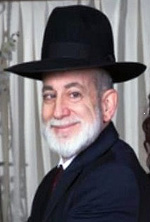I Can’t Wait – Is a Weight!
By Rabbi Yaakov Marks

SAN DIEGO — “And when you come to the land, you will plant all types of fruit trees. For three years, the fruit will be prohibited; in the fourth year, it will be sanctified to praise G-d, and in the fifth year and from then on you may eat from the fruit and the crop will be increased. Do not eat with the blood.” (Leviticus 19:24)
The Torah is commanding us to plant trees in the land and not to have any benefit from the fruit for three years. on the fourth year the crop is brought to G-d and starting with the fifth year it is the property of the owner. Many questions are asked about this. G-d promised the generation that entered Israel that the land would be full of every type of vegetation that they would need. Why then do they need to plant more trees? Why not do something that they need right now? Why make the people wait four years to take full ownership? The Midrash (Vayikra Rabbah 25:8) says that this law is also connected to the subsequent law of not eating meat before the blood is fully extracted from it. What does eating meat have to do with planting trees? Why does the Torah compare these two different laws?
When a person plants a sapling, the owner understands that for the first three years there won’t be much fruit produced and any that does grow will not be of a high quality. However, into the fourth and fifth year, the young tree will start producing delectable delights. There is not much temptation in waiting for the three years to partake of the pleasurable fruits. (Nachmomides Vayikra 19:23)
Rabbi Chaim Ephraim Zaitchik (Toras HaNefesh pp 660-662) says that with this comparison, G-d is teaching us a fundamental psychological and spiritual principle. One of a man’s biggest temptations is compared to this case of planting trees, that of his desire to eat food which in many is exemplified by meat. In the case of eating meat, if the person waits a little bit the action will be totally permitted, however, if done immediately or without waiting the proper time it is prohibited in the form of a negative commandment.
G-d is telling us that just as the pleasure of eating the fruit after three years is so much greater than eating the fruit without waiting, so too in all cases which require patience that the delaying of the gratification till the proper time will bring much greater pleasure. Just like the wait for the fruit is a minimal hindrance when assessed by the farmer, so to the pleasure in any situation when properly thought out a person will see that the pleasure gotten after waiting for the appropriate time will dwarf the ill-gotten pleasure.
Even though the man might have had pleasure from eating the meat while some blood remained in it, the psychological makeup of a person, whose inner desire is to do what is permitted and correct, would completely erase any thoughts of enjoyment following an act which is prohibited. However, when a person has control of his emotions and waits for the proper time to partake, the pleasure he gets surpasses the pleasure taken at the wrong time.
A person has two opposing desires. On one hand, a person wants to satisfy his desires immediately; on the other hand, he wants to do the right thing which may require waiting until the action is permissible. How many times have we heard a person say, “I can’t wait”, “I’ve got to have it” or “That piece of cake has my name on it!”? Almost inevitably fulfilling this action is followed by regret.
However, those people who wait for the proper time end up experiencing pleasure and feeling good about exhibiting restraint. A person on a health journey who sees something he or she shouldn’t be eating and nevertheless makes an excuse and eats it will inevitably have regrets that will spoil any pleasure. A person who waits to reach his goal and then partake will have double satisfaction. He is proud that he had the perseverance to be able to control himself and he enjoyed the treat without regret.
May we have the wisdom to see the value of waiting. May we be blessed with the inner strength to partake of our pleasures at the proper time. May G-d grant us the merit to overcome our short-term desires and reap our long- term satisfaction.
*
Copyright © 2017. Rabbi Marks is a certified health coach, who may be contacted via ahealthyrabbi@gmail.com